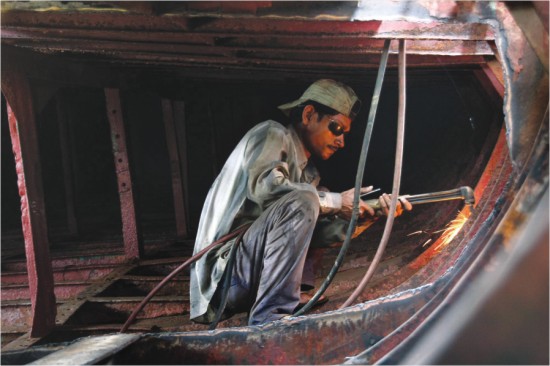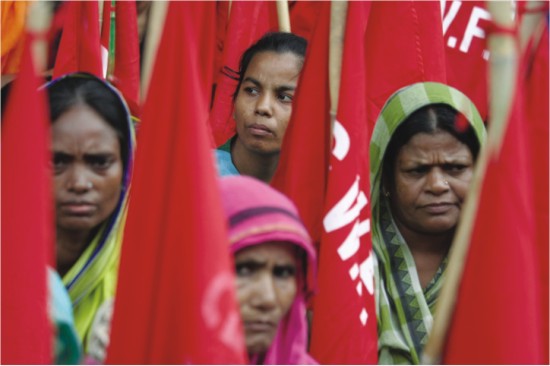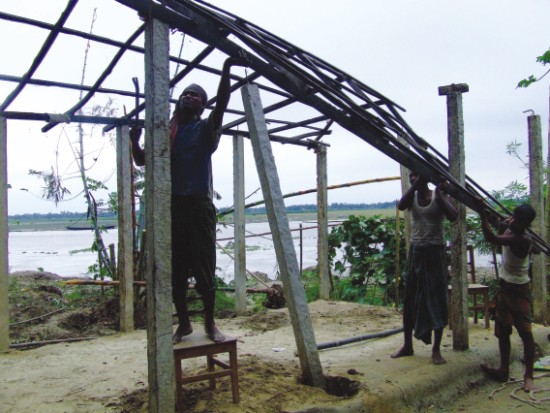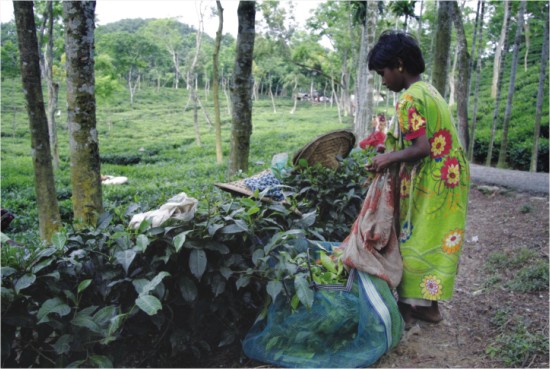
Inside
|
Working for the Devil? Iresh Faruk on a development practitioner's view on donor assistance There are some questions Google simply does not have the answer to. I often wonder why Bangladesh has failed to develop at the same pace as countries around it. I wonder why such a small and compact country with access to international markets has only taken advantage of a small portion of its abilities and potential to determine its own economic, social and political future. I wonder why after nearly two decades of liberal reform, it has not maintained consistent attention to resolve its poverty problematique, with a particular focus on the needs of the extreme poor. Why is it that with such a significant and influential diaspora spread throughout the world, a growing intelligentsia, the looming threat of climate change, increasing central government budgets for social protection and plenty of experiences for Bangladesh to draw from, we cannot devise solutions to even some of the threats and challenges we now face? Is it because we are not motivated? Is it because we are too lazy to come up with the solutions, or think that others will do it for us? Is it because we are too focussed on feeding our families to worry about the bigger issues? Is it because we are despondent and think there is no point in coming up with these solutions because the overall levels of apathy and corruption in the institutions tasked with promoting change will just negate it or (at best) neutralise it anyway? Or is it because most of the time people participate in agendas set by external agents?
Are we forever destined to be (as Henry Kissinger put it) Asia's "basket case?" Will we forever rely on external assistance, aid and other forms of handouts to solve our problems? Have we cultivated a relationship with donors for so long that we have simply forgotten how to do things for ourselves? Are we incapable of thinking for ourselves and determining our own priorities? More importantly, how long can we convince donors that there is a need for continued investment in Bangladesh when our neighbours India, China, Nepal and others have yielded better returns for much less trouble? All I have are questions: no answers. Having worked in the development field for as long as I have, I just wonder why we still need donor support when clearly we have enough intellectual capital, entrepreneurial drive, and now the political stability to overcome the obstacles to achieving both economic development and poverty alleviation. Our neighbours have been able to dictate their own terms to multilateral lending institutions such as the World Bank and Asian Development Bank. Why can't we? Why are we stuck? There are initiatives that value our ideas. The shiree program, for example, starts from the very premise that NGOs have the solutions needed to respond to the needs of the constituents they work with. This is good for NGOs, good for constituents, and ultimately also good for our nation. But as individuals working in these NGOs, or even managing them, we have the same aspirations for our families as those working in the private and government sectors. So we must decide and walk this metaphoric tightrope: do we compromise the vision and ethos of our organisations and ask our children to pay this cost by not having daily tuitions? We also want to send our children to the best schools, buy them nice toys and clothes and keep our families in buildings lit up with generators. The private sector does not have the monopoly on these aspirations. And so we do what we must; and looking back, this is vastly different from what we started to do. Don't get me wrong, I would never work for any other sector other than the NGO sector and yes, I do believe in change. But I don't think that all change is progress in the right direction. Many years ago, my peers in other NGOs and I were able to choose which donors we worked with. We weren't under pressure to roll out credit programs to our beneficiaries simply for the sake of our very survival. We weren't treated as contractors. We were valued as organisations that were most in touch with our respective constituents. Much of that is lost today. I didn't believe it when former US President Ronald Regan first said it and I still don't believe that trickle-down economics is enough for the extreme poor. Whereas political pluralism and democratic polity have been enough to allow countries like India, Singapore and Malaysia to properly channel their growth, these are only prerequisites for Bangladesh, not the solution. Our country has not gone through the traumatic experiences of Latin America (where many economies collapsed because they followed market-economy approaches without adequate supervisory mechanisms) or other parts of Asia (for example, during the Asian currency crisis) or Eastern European countries (inflation and stagnant growth). As stable as our political system now is (and hopefully will continue to be for at least for the next four years), we have much more to address in this short time if we are to adequately respond to the needs of our poorest.
There is a secretly held view in Bangladesh that donors have corrupted the work of NGOs and even government to some extent. I have already mentioned how my peers and I think that many donors treat NGOs and Civil Society Organisations (CSOs) as merely delivery agents, rather than true and genuine development partners. Moreover, some argue that because NGOs are relatively better at smaller scale provision of essential services than government, the economic power of multilateral and bilateral donors has corrupted priorities, especially in rural and remote areas. Donors have cultivated special relationships with niche NGOs in specific areas to take advantage of their abilities to win the trust and confidence of specific groups of people. This pattern is repeated in many different areas and woven together to form a mosaic and blanket where donors can wield their influence and agendas. It is this level of co-ordination through the NGO sector where donors have been able to show more influence than government on the people of Bangladesh. Government has either allowed this to happen, or has sat idly by and watched it with little or no response. The absence of government provision and its inability to create formal state-led systems has allowed special relationships between donors and NGOs that cannot be sustainable in the long run. Doesn't the state have a mandate for determining development priorities? If these priorities are unable to be met, does this necessarily mean that donors and NGOs may occupy this vacuum and simply impose their own priorities onto people who are not their political constituents? Responding to the educational, health and infrastructure needs of the seventy to eighty million citizens with inadequate levels of service is the role of government, not of NGOs and their donor allies. Our present government has acknowledged that there is a need to address both economic development as well as poverty alleviation: economic growth alone will not help eradicate poverty. Many donors also say that they follow this policy, but I personally think they are more interested in economic development than poverty alleviation. When I studied in the United Kingdom, I opened a student savings account at a local bank. The bank lured me to chose their institution over any other by offering me £25.00. I went for it. I was aware that the bank would try and recover this money from me in one way or another, probably by trying to sign me up for a loan or a credit card which I could ill afford at the time. The bank was fine and performed well (I don't really have much to compare it to, mind you, but I never had a problem with the bank and we treated each other with respect and honoured our agreements and so there was no real issue). The cost to the bank, offering a poor student what I thought was a significant amount of money, was (in their minds, I am sure) negligible compared to the amount of money it takes to win a new customer in the UK So this was a good deal for them as well. From what I have read, it costs some banks close to £20.00 to create a new banking customer, so this bank decided to properly incentivise new customers by taking the easy way out: let the costs normally used to win new customers be paid to these new customers directly, and add a little bit extra to entice even more customers to come. Well, the strategy obviously worked. Many of my classmates also chose to set up new accounts with this bank and many are still loyal customers today. My point is that this is exactly what the conspiracy theorist in me thinks of institutions such as the World Bank and others. They hook us in with the promise of poverty alleviation, but all they are really interested in is for countries like ours to latch onto their much more valuable loan and credit products. The multilateral donors know that the cost of small grants to address poverty is almost insignificant when compared to the monstrous loans that countries like ours will eventually take out. The cost of the small grants are built into the overall cost of the loan, just as the cost of my cash reward was built into my student loan or credit card (had I opted for one). And countries like Bangladesh do take out these loans, which we perhaps think on the surface is a good deal. But then along comes their bigger sister, the IMF, to beat up on us. They hammer us into submission by making us agree to cut subsidies where we need them most, to 'liberalise' our economy by cutting expenditure on the types of social safety nets which are meant to benefit the poorest and most vulnerable first. How can these same institutions say they are poverty focussed when their lending preconditions are to curb the expenditure meant to respond to those who can least afford market-based services? When I think of my own reasons for going into development and how much of what I had set out to achieve has actually been accomplished, I am amazed at the lack of progress. During my studies, I had grand dreams and laudable expectations that Bangladesh could resolve its internal income and social disparities within a decade or two. Since that time, we haven't even managed a transition between political governments, something that democracies less sophisticated than ours accomplish relatively smoothly. I used to work because I was passionate about changing the country I live in and the vast number of poor and powerless individuals who are, by some universal fluke, sentenced to a life of poverty. Now, my colleagues and I are also drawn to the development sector because it pays nearly as much as the private sector but requires less of my effort and time. Why is this so? Why should the development field be able to pay me nearly as much as the corporate sector, but expect half as much in return? Surely this disparity cannot be right. Is this the reason why so many development training institutions in Bangladesh exist? Is this the reason why there are so many courses offering to build my capacity (for a fee, of course)? Surely, being educated in the west, I should already have the capacity, shouldn't I? I rarely see my non-Bangladeshi colleagues going for these courses. Did I have the capacity when I graduated, but somehow lost it? Am I really that forgetful? Is this just an excuse for me to bunk off work and have some leisure time? Is this something that I can put on my CV to make myself more marketable and eventually rise to a higher position in my organisation (doing less work for more pay)? Is this an industry created by donors to actually perpetuate the development industry? (My friends in the garment industry laugh when I raise these issues: they work twice as hard for nearly half the wages and have no such opportunities for personal or professional development; yet many argue that as an industry, the garment sector has probably contributed more to the development of Bangladesh than the 'poverty' sector has).
Is development a sector, just like any other (commercial) industry? Do the institutions, NGOs and professionals merely exist to create employment for ourselves? Are donors touting a poverty alleviation agenda merely a smoke screen for the bigger reforms and regime change imperatives that multilaterals and bilaterals pursue? A decade ago, I would have scoffed at the idea if anyone would have said that perhaps all of this money intended to help the poor is really only a distraction to keep so many of us occupied and engaged in a debate while the bigger issues are being discussed and negotiated behind closed doors. Now I'm not so sure. If we really wanted to, the Millennium Development Goals (MDGs) could have been mostly achieved by now (or at least could be well within reach of being achieved by their target date of 2015). This is not the case. Bangladesh's report card on the MDGs suggests that only some of the goals are likely to be achieved, with the vast majority of them being unobtainable by the committed target date of 2015. The resources to achieve these goals exist: and the argument made by Bangladesh and many other governments that there is simply an inadequate level of funding to achieve these goals is simply untrue. Bad arithmetic and poor economic planning on the part of many states (including Bangladesh) have resulted in mistargetted resources. We know that the money rarely goes to where it is intended in many of the poorest countries, and I don't think Bangladesh is an exception. I have noticed recent improvements, but to continue asking for more and more resources means we have increasingly less ability to manage what we have in a manner that can adequately respond to our citizens: I find this alarming. How can we, as NGOs, then say that we know what it takes to respond to the extreme poor on the one hand, have some of the financial and all of the technical resources to do so, and then show no significant change? Isn't this a contradiction? Despite all the home-grown concerns and criticisms we have over the work of donors and how they may be doing more harm than good, they are, at the very least, more effective than our own institutions. We need to reverse this before we criticise donors more. I'm not saying that our criticism isn't warranted; it is. But at the moment, all we are doing is criticising and not showing that there is a real alternative to them. India and China for example, have shown that they are more effective at both engaging communities, mobilising resources and designing programmes that directly respond to the needs of their poorest. Bangladesh has done none of these to show to development professionals like me that we can adequately respond to the growing inequities of our country.
Until we put more rhetoric into action and put forward more alternatives to donor assistance, perhaps we need to halt our search to blame other actors. Perhaps we need a period of Zen-like introspection to contemplate our own destiny and where we want to be in the next ten, twenty even fifty years. Only then can we begin to understand how to get there. But without knowing where we want to be in the next fifty years or having a longer term vision for our country and our people, we should not be firing off criticism and condemnation at those who, as faulty as it may be, have a clearer picture of our country than we do. Iresh Faruk is a development worker who writes on poverty related issues.
|



